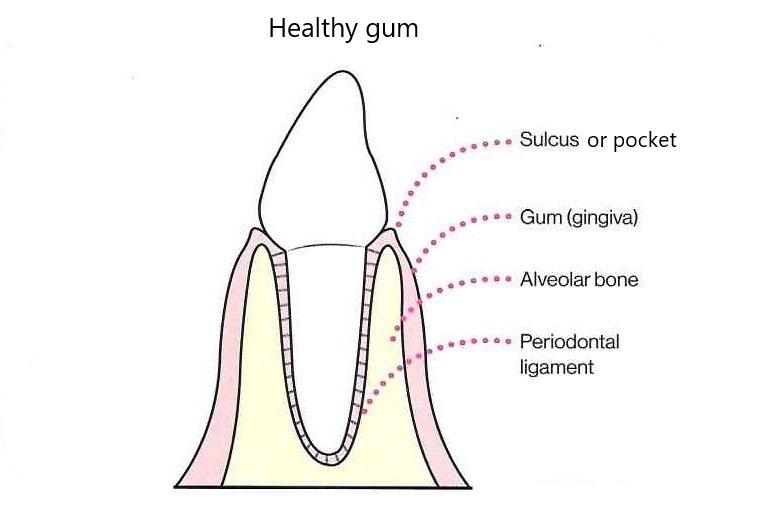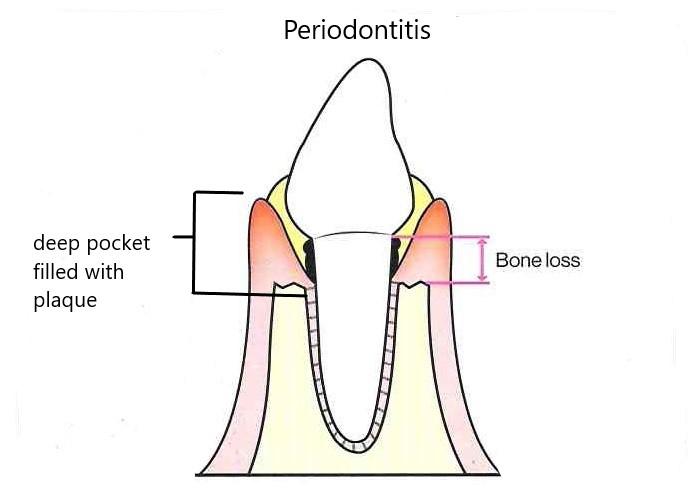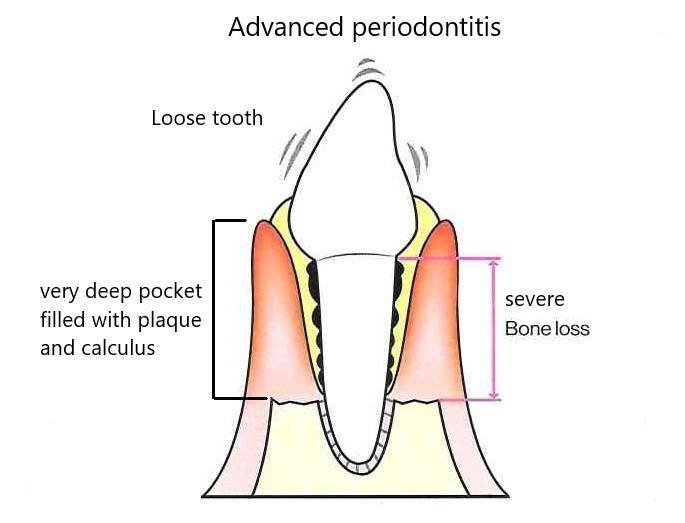
Do your gums bleed easily during brushing, flossing or sometimes spontaneously? The most common cause of bleeding gums is inflammation. Inflammation of gums can range from mild to severe.
In mild cases, the condition is known as gingivitis. The main cause of gingivitis is plaque. Plaque is a film of bacteria lining the teeth surfaces. Plaque is not always visible until there is a heavy build-up where it can be seen as whitish soft deposits on the teeth surfaces and along the gum lines. Plaque disclosing solution can help visualise plaque deposits on the teeth as seen in the photograph. The soft plaque can be scraped and brushed off. This is why it is necessary to brush twice a day and floss daily.
However, if the plaque is left for a long time to accumulate, it can calcify by binding with minerals from saliva, to form a hard substance called calculus or tartar. Once calculus is formed, it cannot be easily removed by brushing and flossing. Only a professional clean by your dentist can remove calculus effectively from teeth.
The bacteria in the plaque and calculus along the gum line, irritate the gums, causing inflammation.
The inflamed gums can appear red in colour and sometimes slightly puffy. The more severe the inflammation, the more likely the gums will bleed easily.
If the inflammation is left unchecked over a period of time, it can lead to destruction of the bone around the teeth. This condition is then known as periodontitis. As the bone around the teeth is destroyed, it can lead to the gums receding and/or the formation of deep pockets between the gums and the teeth. These deep pockets become filled with plaque and calculus and are difficult to clean by brushing alone. The persistence of plaque and calculus in the pockets exacerbates the inflammation of the gums and further destruction of bone. This becomes a vicious circle if no treatment is done and over time, the periodontitis gets worse.
Periodontitis is irreversible. Once the bone around the teeth is destroyed, it cannot grow back on its own. If the disease is not controlled, continuing bone destruction can cause teeth to loosen up and even fall out.
The following pictures show the progression from healthy gums to periodontitis




How are gingivitis and periodontitis treated?
Gingivitis is easily controlled by cleaning off the plaque and calculus around the teeth. The inflammation associated with gingivitis is self-resolved after cleaning. This is why It is advisable to see your dentist for a professional clean every 6 months. Good oral hygiene at home with twice daily toothbrushing and daily flossing, is necessary to control the level of plaque and calculus between professional cleans.
Periodontitis is harder to treat and control. Due to the destruction of bone, there are deeper pockets between the gums and teeth that are difficult to clean. Special instruments used by your dentist are required to remove plaque and calculus from these pockets. This procedure is known as periodontal debridement. It can only be performed by a dental professional. Local anaesthetic usually has to be administered to make the procedure more comfortable.
Prevention of gingivitis and periodontitis requires long-term commitment to good oral hygiene and regular professional cleans. Plaque and calculus constantly build up in the mouth and must be cleaned off to prevent development of disease.
For control of gingivitis, daily brushing and flossing is sufficient for home care in conjunction with 6 monthly professional cleans.
For periodontitis however, additional methods to clean between the teeth might be required. These included special interdental brushes and your dentist will advise you on which types to use.
Professional cleans might be required at a higher frequency such as 3 or 4 monthly to control the disease in the initial phase. Once the disease progression has been stopped, maintenance cleans can then be carried out 6 monthly, depending on the case.
Is specialist referral necessary for the treatment of periodontitis?
When periodontitis is very advanced and not improving, referral to a specialist (periodontist) might be necessary. The periodontist uses surgical techniques to clean the deep pockets more effectively. They also can use procedures that help regenerate the bone around the teeth in selected cases.
Are other health factors associated with periodontitis?
Smoking and uncontrolled diabetes contribute to the severity of periodontitis. There is also an association between the presence of periodontitis and risk of stroke and heart disease.
In pregnant women, risk of premature delivery is also associated with the presence of periodontitis.
At the Melbourne Smile Clinic, we will screen for the presence of gingivitis and periodontitis at your first appointment and advise you as to the appropriate treatment regimen to achieve health.
Key points
- Prevention and control of gingivitis and periodontitis is a life-long commitment
- Periodontitis also has an impact on general health

Located in Melbourne Inner North, The Melbourne Smile Clinic is your dentist for Northcote, Thornbury, Fairfield, Westgarth, Clifton Hill, Preston and surrounding suburbs.
For more information or for an appointment, contact us on 9078 4471 or send us a message here
